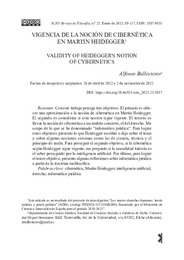Please use this identifier to cite or link to this item:
https://hdl.handle.net/11000/38147Full metadata record
| DC Field | Value | Language |
|---|---|---|
| dc.contributor.author | Ballesteros, Alfonso | - |
| dc.contributor.other | Departamentos de la UMH::Ciencia Jurídica | es_ES |
| dc.date.accessioned | 2025-11-12T11:20:05Z | - |
| dc.date.available | 2025-11-12T11:20:05Z | - |
| dc.date.created | 2022-11 | - |
| dc.identifier.citation | SCIO. Revista de Filosofía, nº 23, Enero de 2023, 89-117, | es_ES |
| dc.identifier.issn | 2603-6924 | - |
| dc.identifier.issn | 1887-9853 | - |
| dc.identifier.uri | https://hdl.handle.net/11000/38147 | - |
| dc.description.abstract | Con este trabajo persigo tres objetivos. El primero es ofre- cer una aproximación a la noción de cibernética en Martin Heidegger. El segundo es considerar si esta noción sigue vigente. El tercero es llevar la noción de cibernética a un ámbito concreto, el del derecho. Me ocupo de lo que se ha denominado “informática jurídica”. Para lograr estos objetivos presento lo que Heidegger escribió o dijo sobre el tema y sobre algunas nociones cercanas como las de ciencia, técnica y el principio de razón. Para perseguir el segundo objetivo, si la cibernética según Heidegger sigue vigente, me pregunto si la causalidad todavía es el saber perseguido por la inteligencia artificial. Por último, para lograr el tercer objetivo, presento algunas reflexiones sobre informática jurídica a partir de la doctrina iusfilosófica. | es_ES |
| dc.description.abstract | With this paper I pursue three objectives. The first is to offer an approach to the notion of cybernetics in Martin Heidegger. The second is to consider whether this notion is still valid. The third is to carry out the notion of cybernetics to a specific field, that of law, to what has been called "legal informatics". To achieve these objectives, I present what he wrote or said on the subject and on some related notions such as science, technique and the principle of reason. For Heidegger, cybernetics is a new fundamental science that replaces philosophy. To pursue the second objective, if cybernetics according to Heidegger is still valid, I wonder if causality is still the knowledge pursued by artificial intelligence. I conclude it is, causality is still pursued for utility reasons. Finally, to achieve the third objective, I present some reflections on legal informatics based on the iusphilosophical reflections of some authors. | es_ES |
| dc.format | application/pdf | es_ES |
| dc.format.extent | 29 | es_ES |
| dc.language.iso | spa | es_ES |
| dc.publisher | Universidad Católica de Valencia (UCV) | es_ES |
| dc.rights | info:eu-repo/semantics/openAccess | es_ES |
| dc.rights | Attribution-NonCommercial-NoDerivatives 4.0 Internacional | * |
| dc.rights.uri | http://creativecommons.org/licenses/by-nc-nd/4.0/ | * |
| dc.subject | cibernética | es_ES |
| dc.subject | Martin Heidegger | es_ES |
| dc.subject | inteligencia artificial | es_ES |
| dc.subject | derecho | es_ES |
| dc.subject | informática jurídica | es_ES |
| dc.subject | cybernetics | es_ES |
| dc.subject | Martin Heidegger | es_ES |
| dc.subject | artificial intelligence | es_ES |
| dc.subject | law, legal informatics | es_ES |
| dc.subject.other | CDU::3 - Ciencias sociales::34 - Derecho | es_ES |
| dc.title | Vigencia de la noción de cibernética en Martin Heidegger | es_ES |
| dc.title.alternative | Validity of Heidegger's notion of cybernetics | es_ES |
| dc.type | info:eu-repo/semantics/article | es_ES |
| dc.relation.publisherversion | https://doi.org/10.46583/scio_2023.23.1057 | es_ES |

View/Open:
Ballesteros. Vigencia de la noción....pdf
375,92 kB
Adobe PDF
Share:
.png)
